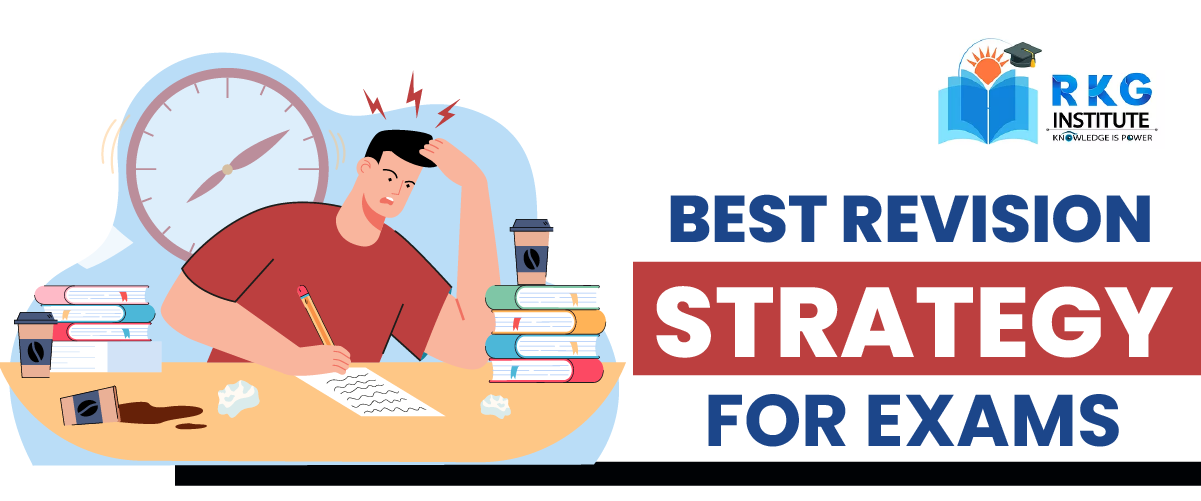Exam season is on and the importance of revision cannot be neglected by the candidates. Preparing strategy for revision is as much important as strategizing for studies. Most often, students allot less value to revision and are ignorant about its significance. Appearing for exams without revising your syllabus will turn out to be more difficult and confusing than appearing in exams without studying at all. It creates the pressure of having read the topic but not able to answer questions.
This blog will discuss in detail, a three-step revision strategy for your exams, often appreciated by toppers and educators. Make sure that you finish your syllabus in time (preferably 1-1.5 months before your exam) so that you leave enough time for revising. Following this technique will definitely show up in your results.

Step 1: Read your notes
We all make notes for different topics but rarely do we go through them. The first step while starting your full scale revision is to read your notes as well as the highlighted portion of the textbook you referred to while studying. Go through this article by RKG institute to get more idea on note-making.
- Allot different days/time slots for a particular chapter or topic you want to revise. Select a topic/chapter for a time slot and follow these four steps to revise it.
- Read the notes of that chapter.
- Go through the text that you highlighted while reading your book.
- If there is something to memorise, like formulas or facts, point those things out and write them 5-10 times on a sheet of paper without looking at your notes/book. You can also use mnemonic techniques for memorization.
- Use maps, diagrams, graphs, flowcharts etc. to revise, if applicable. Practice drawing these things 2-3 times.
You can also add content in your notes at this step so that you don’t miss any information. This will increase your understanding of the subject.
Repeat the same four steps for each topic/chapter of every subject. At the end of this session, you would have covered your whole syllabus once again, in a short format, and memorised and practiced everything that was required. You are now ready for the second step.

Step 2: Have the Examiner’s eye
You have now entered into a more important step, which most of the students miss. Following this step will automatically provide you a huge lead among the other candidates. Point out questions that you would if you were the one who will set the question paper. Consider yourself as the examiner.
- For each chapter, create a question bank yourself. Point out every question from the text, either short or long, and write them down in your notebook. This is a necessary step for theory subjects. Usually, 30-70 questions can be formulated from each chapter.
- The above step can be skipped for practical subjects. Instead of forming questions yourself, solve as many questions as you can. You will find thousands of questions for practice on the internet.
- While practicing the above two steps, consider yourself as the examiner. This will help you find out questions from depth and your concepts will be crystal clear. You can take help of your teacher/mentor if you want to.
This practice will provide you extreme confidence and self-faith and you will be tension free on you examination day.

Step 3: Solve Sample papers
This is the last step you need to master in. You can ensure your full marks in every subject by practicing honestly. Write as many sample papers as you can before your examination.
- You can access free and paid sample papers on the internet for every subject. You can also consider purchasing a compilation of sample question papers which is easily available in the market. Practice those sample papers in time bound and exam environment. It is advisable that you practice at least 5 sample papers for each subject before your exams. The more you practice, the better you become.
- Go through the previous year question papers of the examination you are appearing for without second thoughts. They would be easily available on respective websites. Practice them to know the exact level of your exam.
- You can get your solved papers checked by your teacher, if possible. You can also check it yourself strictly with honesty.
- Practice in the time slot in which your examination is scheduled. Be very strict about the time and other formalities.
Don’t take these sample question papers lightly. Consider each paper as your real exam. This will help you fight the fear of examination and ingrain confidence in your minds.
This strategy may seem a bit difficult or time taking initially, but if followed religiously, it will definitely ensure full marks for you. Refer to our previous blog to get more study tips for exams.


